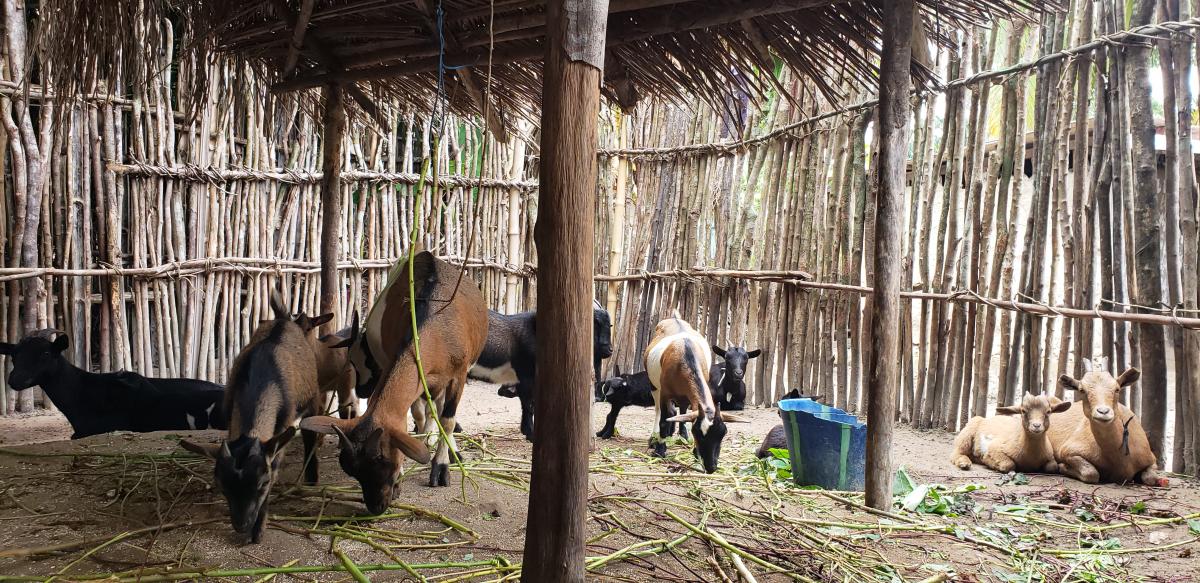Backyard Animal Husbandry

(L-r) Calvin J. Clarke.
-- How this clergyman earns living raising goats and other animals
Calvin J. Clarke, a resident of the Phebe Airstrip Community in Suakoko, Bong County, always wanted to become a livestock farmer. Clarke’s passion for rearing animals is traced back to his high school days.
“It was one time that I visited my uncle in our village. While talking to him, I noticed goats and other animals around the farm. When I asked him about them, he told me that he was the owner of them. I was impressed by what I saw and I decided that I will study animal science after high school,” says Clarke.
Two decades on, Clavin is now living his boyhood dream. Currently, he raises more than 25 goats with rabbits and guinea pigs in his backyard. Even though it was Clarke’s boyhood dream of becoming rearing animals, it was in 2017 that he started rearing animals.
“Sometime in 2017, when my wife was graduating from college, the family decided that we have a party to celebrate her achievement. So I took a tour around the Kpatawee Waterfall in search of a goat. It was there that I saw two small goats. They had just killed their mother. So I bought the two young goats along with the goat that we wanted for the celebration. So from two goats, I have generated more than thirty goats. But we have been selling since two years ago,” he says.
So far, Clarke has earned L$127,500 from the sales of goats and rabbits over the last two years. He sells to residents in the Suakoko area.
“Many people in the Suakoko area know my place. People from the Bong County Health Team, Cuttington University, and the Central of Agricultural Research (CARI) come here to buy goats from me,” he says.
Clarke, who also pastors a church in the Phebe Airstrip area, says that profits from the sales of animals help him meet the basic needs of his family.
“It is through the sale of these animals that I feed my family, pay my children’s school fees, and pay the rent of the house,” he says.
When asked how he shares his time between the two jobs- pastoring a church and rearing animals, Clarke says, “I have managed to keep a balance between the two.”
“As for the farming, I have the boys that are helping me to look after the animals. They are the ones going out to get feed, cleaning the animals’ house, and performing other responsibilities when I am not around. This has enabled me to perform my responsibilities at the church,” he said.
Despite livestock farming proven to be a successful venture for Clarke, he claims that he could earn more if veterinarian services were at his disposal.
“We share our experiences about managing the animals. If the case is not common to us, we lose the animal and we lose money. There was a time when three of my rabbits got sick. I didn’t know what was happening to them so I reached out to a few farmer-friends for help. But it was strange to them, they could not help. So the only thing that I did was to isolate them from the others and watch them die,” he says.
Similarly, the rearing of animals in the middle of a town has been another hurdle for Clarke, “Raising goats in a town is not an easy task. Residents sometimes complain. They complained about the goats eating their vegetables and even took matters to the town chief. So I have to fence the yard to prevent misunderstandings with my neighbors."
“Also I have managed to store up animal manures for vegetation purposes. I have a few farmers buying the manure. So instead of throwing the animals’ manure away, now farmers come and collect them,” says Clarke.
Amid the existing challenges confronting Clarke, the clergyman is urging fellow ministers of the gospel who are working in the rural part of the country to undertake a similar venture. “You cannot refuse to venture into farming because you are a pastor.
Farming will help in so many ways. Look at me for example, even though I am a pastor, I am not depending on the church to feed my family,” says Clarke.
According to him, starting does not always have to be big.
“Anyone who wants to go into this type of farming will not need to start on a large scale. One can start with a pair of goats. That was how I started, and now I have thirty-six goats,” he says.

